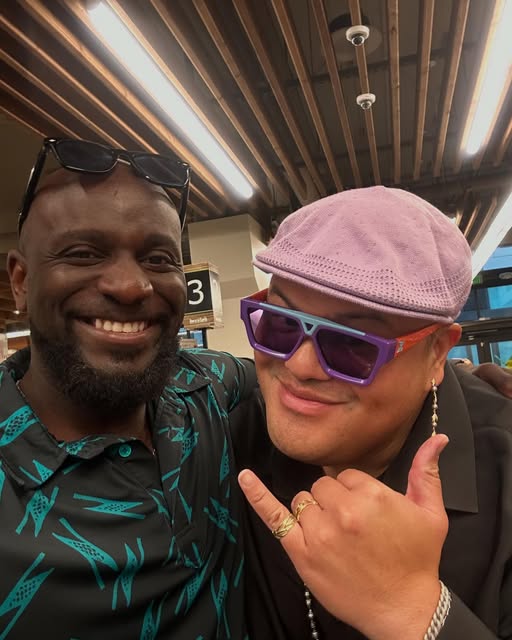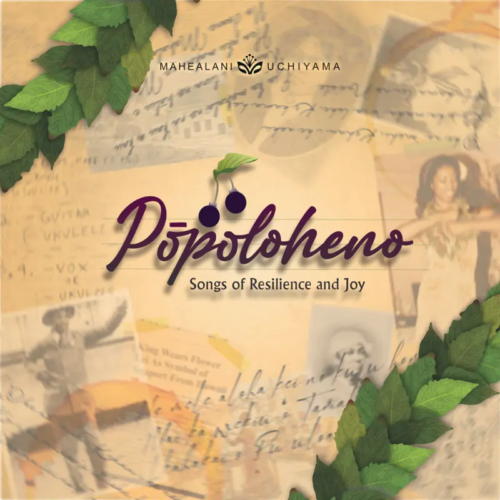Winner of multiple Grammy and Hōkū awards, Kalani Pe’a celebrates 10 years of music

Kalani Pe’a (right) and Kamakakēhau Fernandez pose for a photo. Pe’a opens his new album, “Popoloheno: Songs of Resilience and Joy,” with the song “Kamakakēhau,” as a tribute to Fernandez. Courtesy photo
Performing an intimate show at the ProArts Playhouse on Aug. 9, multi Grammy winning musician Kalani Pe’a won three Nā Hōkū Hanohano awards in June for his latest album, “Kuini.”
Winning Hawaiian Music Album of the Year, Hawaiian Music Video and Liner Notes, a friend accepted the awards as Pe’a was in Tahiti.
“It was so nice to hear Tahitian music while you have your dearest friends like Natalie Ai Kamauu accepting the awards while I was on vacation,” he said. “That was the best feeling — to be on vacation and hear my Grammy-winning ‘Kuini’ receive three Hōkūs.”
The acclaimed artist is involved in a unique project, “Popoloheno: Songs of Resilience and Joy,” a new compilation that celebrates the stories and culture of Hawaii’s Black community.
“I’m really happy to be part of this album, and help my dearest friend Kumu Hula Mahealani Uchiyama with the launch of her new project to honor our beautiful African American brothers and sisters of our community working in the Hawaiian kingdom,” he said.
Maui is also represented on the album with songs by Ikaika Blackburn, Kamakak�”hau Fernandez, and Kaulike Pescaia. Other artists involved include Oahu-based jazz singer Azure McCall, Kumu Hula Kawika Alfiche, Patrick Landeza, and former Hawaii resident Kumu Hula Uchiyama, who produced and sang on the collection.
The Kumu of Hālau KaUaTuahine in Berkeley, Calif., Uchiyama conceived the project as a way of illuminating a forgotten history.
“I knew her from when I sold out a few shows around San Francisco,” Pe’a explained. “She was my go-to hālau. Mahealani taught my original songs to her students, and we have collaborated and shared mele Hawaiʻi all over California. She’s a proud Black woman, and she speaks Hawaiian fluently.”
Pe’a opens the album with the beautiful song “Kamakak�”hau,” a tribute to Fernandez, who was born in Arkansas, adopted by Robyn Naeʻole and raised on Maui.
“I wrote a song to honor my Maui friend, Hawaiian musician Kamakak�”hau Fernandez, who was brought here as an infant and now he’s one of the most beautiful falsetto singers,” he said.

“Popoloheno: Songs of Resilience and Joy” celebrates the stories and culture of Hawaii’s Black community. Courtesy photo
Pe’a wrote in a YouTube post: “The kaona of this mele exemplifies in his name. As a dewdrop strikes one’s eye — meaning Kamakak�”hau being the pua (flower) drifting ashore (coming from Arkansas to Hawaii), his mother and family sheds that tear, that ‘dewdrop’ to hānai, rear, nurture and love this exquisite African American baby who later became a voice of our lāhui through music and perpetuating ‘Ōlelo Hawai’i.”
With original mele, “Pōpoloheno” celebrates the contributions of people of African descent who arrived in Hawaii soon after the time of the first Western contact. Initially welcomed as a valued part of the community, they were doctors and businessmen, scholars and musicians, lawyers and trusted members of the Royal Court.
The title Pōpoloheno is named after the pōpolo, a black-colored berry found throughout Polynesia. Valued for its medicinal qualities, it became associated with people of African descent because of its rich, dark coloring. The term became pejorative, and the new project reclaims the word, honoring the positive meanings of the pōpolo.
Among the songs, the Latin-flavored “Kumuniu Cumbia” by Pescaia tells of Peter Hose from Cape Verde, known as the “Hula Cop” because of the unique, dance-like way he directed traffic. “I’m excited to be a part of this project because it helps to gently challenge the limits of our Hawaiian art,” Pescaia wrote on Facebook.
Fernandez pays tribute to his Hawaiian home, chanting in Hawaiian and English on “He Mele Awaiaulu No Hawaiʻi Haʻaheo.” Alfiche’s chant on “Ka Pua Mohala” highlights John Blossom, a former Jamaican slave who served in the court of Prince Kapaʻakea and died while attempting to free enslaved Polynesians in Chile.
Uchiyama’s “Wahine Hoʻōla” honors Alice Ball, who developed the first successful treatment for Hansen’s Disease in 1915, and “Pua Laulele” performed by Blackburn celebrates former slave Betsey Stockton, the first African American woman to land in Hawaii in 1823, who became a teacher at a Lahaina mission.
Musicians contributing include Jerome Koko of the Makaha Sons and Wailau Ryder. A No Depression review of the album praised it as “a fascinating, vital musical document.”
Along with performing concerts on Oahu and in the Bay Area celebrating the release of “Popoloheno,” Pe’a will perform at the ProArts Playhouse on Aug. 9.
“Since the launch of my first Grammy and Hōkū-winning album, I’m celebrating my 10th anniversary of recording Hawaiian music,” he said.
“Kalani Pe’a: Eia Lā – Celebrating 10 Years of Hawaiian Music” will be at 7:30 p.m. Aug. 9. Tickets are $45-$75 at proartsmaui.org/.
